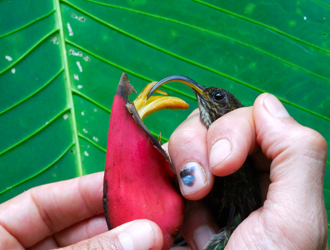Students gain firsthand experience in Ecuador
For some Tulane University students, a bird in the hand is ⦠well, the most interesting way to learn about conservation.

By capturing birds in mist nets, students learn first-hand how the bill shape of the sickle-billed hummingbird has co-evolved with the flower morphology of the Heliconia flowers they pollinate. (Photo by Malinda Chambers)
During the course, students experienced first-hand the challenges and rewards of conducting field research and implementing conservation activities in tropical environments.
“It is always different to experience something for real rather than just learning it in a book. An example is how we experienced the rain forest waking up at dawn. I couldn't have imagined that without experiencing it,” said senior Nathan Frumkin.
These activities took place within the context of community engagement based on active collaboration and interaction with local Ecuadorian residents.
“The most impactful thing about this course to me has been hearing the personal stories and interacting with the Ecuadorian crew on a day-to day-basis,” said senior Courtney Amabile. “Just being here, doing hands-on research with experienced crews who are willing to interact and joke and absolutely obliterate language barriers with a simple smile, it has completely moved my outlook and my future plans forward. I feel like this course has very much so assisted me in solidifying the fact that I want to do field research.”
In addition to offering three academic credits, the program fulfills the second-tier public service requirement for the students. The course is one of the International Service-Learning Programs offered by the Center for Public Service, and is open to all majors.
“This course has changed how helpless I've felt when it comes to conservation. I've never really felt that I was making a difference. Now I think I could find a path that could make a difference,” said senior Martine Domangue.
